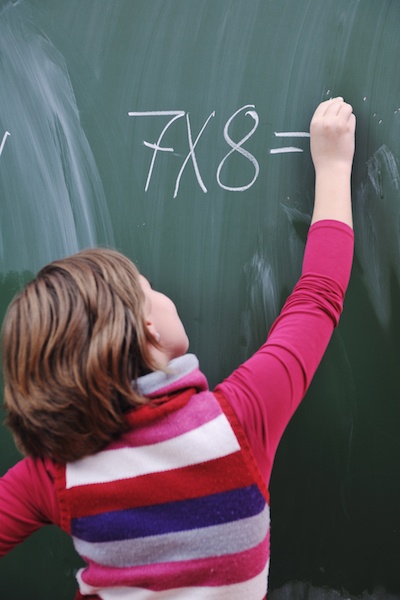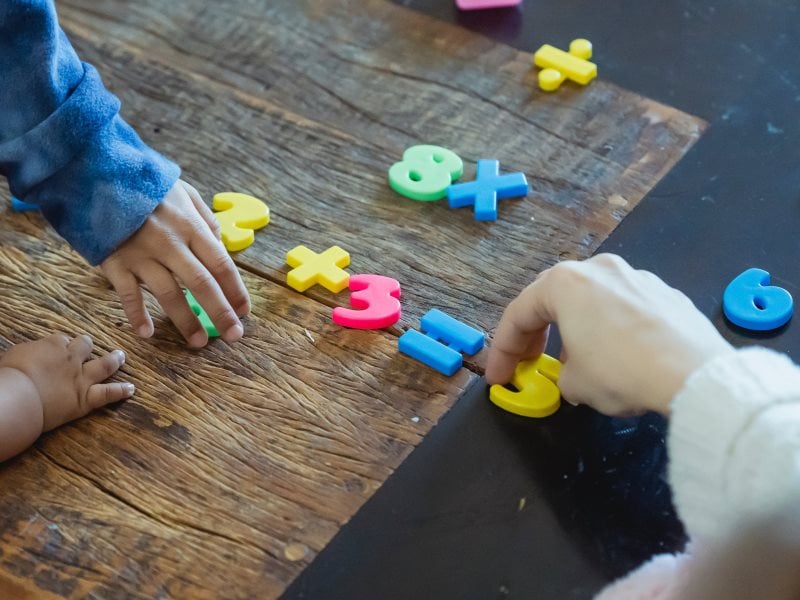Math, as well as reading and writing, is one of the core subjects we use on a daily basis and a subject we expect kids to know how to do. Some parents struggle with the question “What is the right age to teach my child to learn math?” The question can seem difficult and tough to answer, but the answer is actually quite simple: start at an early age.
Piaget’s Cognitive Development Theory
In 1936, a man named Jean Piaget became known for his theory on Cognitive Development, which is a theory that focused on children’s development. He believed their developmental stages in cognition were done through stages of thought process. According to SimplyPsychology, “ The goal of the theory is to explain the mechanisms and processes by which the infant, and then the child, develops into an individual who can reason and think using hypotheses.”
mechanisms and processes by which the infant, and then the child, develops into an individual who can reason and think using hypotheses.”
The four stages in Piaget’s Cognitive Development theory are:
● sensorimotor
● preoperational
● concrete operational
● formal operational
According to Piaget’s study, children can learn the idea of numbers at an early age. In his sensorimotor stage (birth- 2 years), children learn object permanence, which is knowing an object still exists even if it is not visible.
Applying the sensorimotor stage to math
In Bobby Ojose’s “Applying Piaget’s Theory of Cognitive Development to Mathematics Instruction” in the journal The Mathematics Educator, he mentions the sensorimotor stage and how children in this stage link numbers and objects.
-
“An additional characteristic of children at this stage is their ability to link numbers to objects (Piaget, 1977) (e.g., one dog, two cats, three pigs, four hippos). To develop the mathematical capability of a child in this stage, the child’s ability might be enhanced if he is allowed ample opportunity to act on the environment in unrestricted (but safe) ways in order to start building concepts (Martin, 2000). Evidence suggests that children at the sensorimotor stage have some understanding of the concepts of numbers and counting (Fuson, 1988). Educators of children in this stage of development should lay a solid mathematical foundation by providing activities that incorporate counting and thus enhance children’s conceptual development of number.”
In simpler terms, Ojose is suggesting that children understand concepts of numbers and counting at a very early stage in life (as he relates this to Piaget’s theory) and that parents and educators should help contribute to this stage by teaching and enhancing their mathematical skills.
The learning of math at an early age leads to other achievements.
Greg Duncan, PhD, of Northwestern University’s Researcher and Professor of Education and Social Policy, said "We find the single most important factor in predicting later academic achievement is that children begin school with a mastery of early math and literacy concepts.”
Children who are taught math early and learn the basics at a young age are more likely capable of a lifetime achievement in all aspects of their academic performance. He continues by mentioning one of the key factors in the study.
"The paramount importance of early math skills - of beginning school with a knowledge of numbers, number order and other rudimentary math concepts -- is one of the puzzles coming out of the study," said Duncan and a faculty fellow at the Institute for Policy Research.
Numbers and counting at an early age
Although it is unrealistic for a child to grasp how to do addition and subtraction, children at a young age, like mentioned previously in Ojose’s work, are exposed to numbers and counting.
Dr. Douglas Clements, Professor of Mathematics and Computer Education at the State University of New York, Buffalo and author of Early Childhood Mathematics Education Research: Learning Trajectories for Young Children (Studies in Mathematical Thinking and Learning,) discusses how children as young as the infancy stage can grasp the idea of numbers and counting.
“There are precursors to numerical understanding that children can do at a very young age. For example, research tells us that by 6 to 12 months of age, children can recognize small groups of numbers without counting,” says Dr. Douglas Clements.
There has been myriad amounts of research and data that show how teaching your child math at an early age is beneficial. Instead of holding back on mathematics because of age, the subject should be introduced and practiced everyday.
How can you teach your child math?
Here are a list of ways you can help teach your young one math as young as 6 months old.
- Read stories, sing songs, or recite poems that involve numbers and counting.
- Ask your child “How many?” when you see something with 1 or more of the same object. This can be done when you and your child are out, or simply with objects at home.
- Very simple board games.
References:
Clements, Douglas H. "Mathematics in the Preschool." 7.5 (2001): 270-75. Web. 17 Oct. 2017. Leopold, Wendy. "Early Academic Skills, Not Behavior, Best Predict School Success.”
Northwestern University . 2007. Web. 17 Oct. 2017.
McLeod, Saul. "Jean Piaget." Cognitive Theory | Simply Psychology . N.p., 2009. Web. 17 Oct.
2017.
Ojose, Bobby. "Applying Piaget’s Theory of Cognitive Development to Mathematics
Instruction." The Mathematics Educator 18.1 (2008): 26-30. Print.
"The Importance of Teaching Math in the Early Years – ETL Learning." ETL Learning The Importance of Teaching Math in the Early Years Comments . Web. 17 Oct. 2017.





